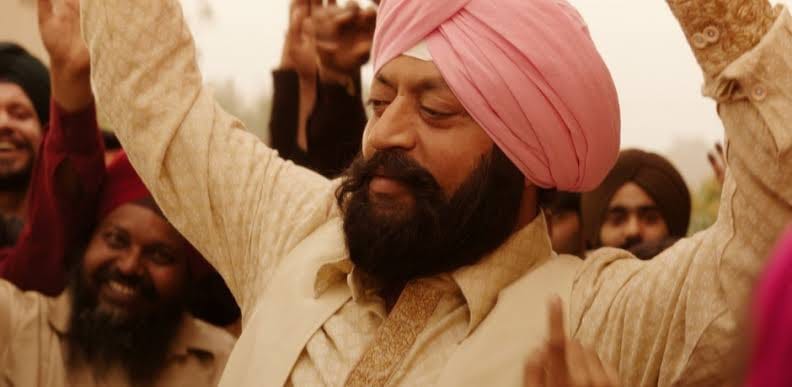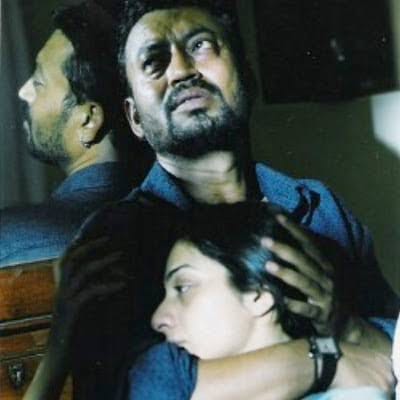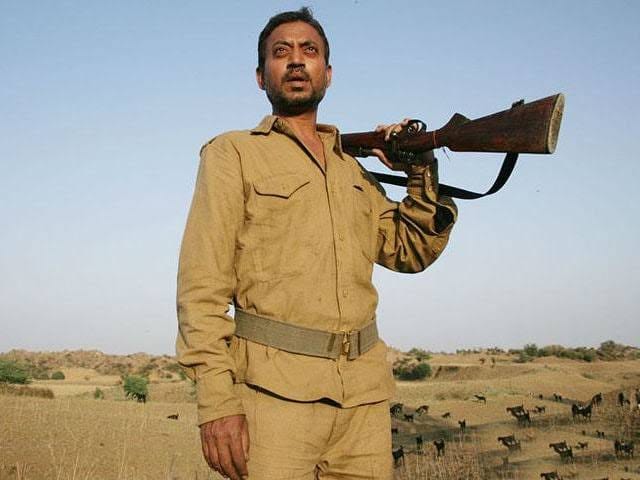Luigi Pirandello in his play ‘Six Characters In Search Of An Author’ says: “When a character is born, he acquires at once such an independence, even of his own author, that he can be imagined by everybody even in many other situations where the author never dreamed of placing him; and so he acquires for himself a meaning which the author never thought of giving him.” That might be true for some characters and actors. But in case of Bollywood actor Irrfan Khan, the character that he played became more dependent on the actor. Irrfan has lent to his characters such intensity, depth and innovative appeal that the actor has become more pronounced than each of his roles, be it that of a father, lover, sportsman, henchman or dacoit.
Irrfan as a father
Irrfan is still lingering on our minds as Champak Bansal – the extremely loving and supporting father of Tarika – in ‘Angrezi English’. Champak values integrity and hence is not reluctant to expose judge Chheda, who is corrupt and accepts bribes. Somehow, this kind of a role of a father becomes Irrfan – upright, unrelenting and defying the norms and expectations in a gathering of parents-wards-teachers. Champak is rooted to his soil, proud of his Ghasiteram surname but yet understands the aspirations of Tarika to go to London for higher studies. He is ready to ask forgiveness from her schoolteacher for his conduct at the school event, yet when she tries to belittle his intentions, he is not afraid to humiliate her in return. As a determined father, Irrfan shines. His pledge to take his daughter to study abroad makes him overcome his own ideology and Indian values. The father-daughter relationship is beautiful and evocative in many senses, and we cannot help admire Irrfan’s connect with his screen daughter Radhika Madan.

In contrast to his image of a loving father, Irrfan is no less convincing as a stubborn and illogical father in ‘Qissa’. The kind of exemplary character that Irrfan showcases through Umber Singh only he could have done. Umber Singh as an extremely misogynistic father refuses to accept his fourth daughter as a girl because of his expectation for a son. He even gives her the name of a male Kanwar Singh. In the garb of an unconventional and inflexible character of Umber Singh, Irrfan stands undaunted and resolute – the despicable character who attempts to rape his daughter-in-law Neeli as the only way to beget a grandson. Irrfan as Umber Singh, like in most of his roles, is disconnected from the external reality – he creates his own reality to survive in the Indian patriarchal society.
Irrfan as Ashoke Ganguly – the father of Gogol in ‘The Namesake’ was equally convincing. Though he died early in the movie, his profound influence on his son and the reasons for naming him so shaped the character of Gogol, who was culturally disoriented for some time. Though not a Bengali, Irrfan immersed into the skin and accent of Ashoke Ganguly as easily as a tea bag into hot water imparting all the right flavours.
Irfan as a lover and underworld don’s henchman

Those of you who have read William Shakespeare’s ‘Macbeth’ would agree that there could not have been a better Indian Macbeth than Irrfan as Maqbool. ‘Maqbool’ unfortunately did not do that well in the box office, but it did help earn international acclaim for director Vishal Bharadwaj. And no one can deny the contribution of Irrfan towards this international recognition of the film for his excellent, vivid portrayal of Macbeth. Personally, I can never get tired of watching ‘Maqbool’. The selfish camaraderie of Abbaji (Pankaj Kapur) and Maqbool is something to watch repeatedly and yet never get tired. Those big intoxicating eyes of Irrfan turn bloodshot, burning with ambition and jealousy for Abbaji sometimes, and coy, full of drunken love and passion for Nimmi the next instant. Who can forget such a compelling character played by our favourite actor Irrfan? Maqbool is super ambitious, stubborn, determined and headstrong on one occasion and guilty, flexible, loving and full of passion at the next hour. Who better than Irrfan could have showcased such contradictions in the same character? Can anyone forget the scene of Nimmi trying to rub off imaginary blood stains from the walls of her room and Maqbool consoling her that it’s not real and it’s all over. Please watch it tonight if you still haven’t.

As is his usual style, Irrfan is an unusual lover in Tanuja Chandra’s ‘Qarib Qarib Singlle’ – but one you would not forget even if you watched the movie casually. One of the greatest virtues of Irrfan as an actor is he blends with his co-actors to an extent that you never feel there is a lack of chemistry between them. Whether it is a new actor like Radhika Madan in ‘Angrezi Medium’ or Parvathy Thiruvothu (Hindu debut) in ‘Qarib Qarib Singlle’, Irrfan makes the audience feel the easy vibes. I would not be surprised if his co-stars felt the same. He adopts a non-assuming role in ‘Qarib Qarib Singlle’ that moves on to develop into the garb of an imposing and passionate, idealistic lover in due course of the film. Devoid of feelings in the first half, we see Irrfan as a deep romantic in the second half.
Irrfan as a sportsman/dacoit

Somehow Irrfan Khan’s penchant for unconventional characters gives him the right chances and choices. Portraying a character that won a gold and then rebelling against the system was naturally quite Irrfan-istic! Paan Singh Tomar is another case in point. Undoubtedly, his performance won him the national award. The circumstances under which Paan Singh joins the army, why he leaves it, how he avenges his mother’s death and creates terror as a dacoit in the Chambal Valley is effectively portrayed by Irrfan. Again, like in the movie ‘Qissa’, one would love Irrfan to hate the character of Paan Singh Tomar played by him.
Irrfan in the role of an informer

Roohdar might seem as an insignificant role portrayed by Irrfan. But the role is riveting. It was through the character of Roohdar that firms up Haider’s resolution of avenging his death of his father. The mystery and vagueness of such a character was portrayed by the naturally talented Irrfan who increased the evasiveness of such a role. It was through Roohdar that Haider comes to know many truths about his father Hilaal and uncle Khurram. It was Roohdar who suggests Haider to get proper training in Pakistan to murder his uncle. Irrfan adds layers to the character of Roohdar, who reminds us of the ghost in Hamlet. Irrfan would have been equally fantastic as a ghost, had Vishal Bharadwaj been tempted to introduce the supernatural in Haider, like Shakespeare did in Hamlet.


